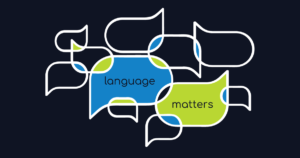Our Language Matters
This blog post is co-authored by Haley P., a domestic violence advocate in Oregon. Inspiration from this blog came from a conversation about oppressive language in PreventConnect’s recent blog post Reclaiming Crazy: Women Athletes in Nike’s Ad.
Sexual assault and domestic violence advocates continuously work to improve practices and policies to be more trauma-informed by avoiding re-traumatizing the folks they serve. Sexual and domestic violence prevention practitioners have similar goals in mind when crafting prevention messages. In order to be trauma-informed it’s imperative to understand historical trauma and intersecting oppressions.
Oppression is used to gain power and control over a population. People who abuse, assault, and perpetrate violence use the oppressions in our society and in our systems as a tool to silence and discredit the people they harm. Trauma-informed advocates and prevention practitioners need to be mindful of how our language can also be used as a tool to silence, discredit and isolate survivors.
 The words we choose to use and the historical roots of our words are powerful. When we unintentionally use racist, ableist, transphobic, homophobic, sexist, ageist, and sizeist words we cause harm. Such words are embedded in our language as a means to minimize and normalize oppression. It’s not by accident that we call a group of women “girls” without thinking twice about assuming their gender identity or inferring women are children. It’s not by accident that we say “crazy” without recognizing that we are minimizing the experiences of people that have mental health needs or barriers.
The words we choose to use and the historical roots of our words are powerful. When we unintentionally use racist, ableist, transphobic, homophobic, sexist, ageist, and sizeist words we cause harm. Such words are embedded in our language as a means to minimize and normalize oppression. It’s not by accident that we call a group of women “girls” without thinking twice about assuming their gender identity or inferring women are children. It’s not by accident that we say “crazy” without recognizing that we are minimizing the experiences of people that have mental health needs or barriers.
Oppression is so ingrained in our society that most of us have been socialized to ignore the harm our oppressive words cause. When working to change oppressive and violent social norms, sometimes the impact of our messaging contradicts the intent of the message. What can we do when big national ads that promote women’s equity, like Nike’s “Dream Crazier” ad, also simultaneously promote language that is harmful to others?
It’s not easy to eradicate oppressive words in our vocabulary, but as trauma-informed advocates and prevention practitioners striving to create equality, we need to do better. Let’s work to be mindful of our language choices. Let’s not unintentionally uphold oppression. Let’s open up dialogue at our agencies about the trauma-informed words we want to use and the violent and oppressive words we want to avoid. Let’s have honest learning moments with ourselves and others as we examine the impacts our language choices have on our field and on survivors.
One way to engage in learning moments for language transformation with ourselves and within our communities is through calling in, which Ngọc Loan Trần explains the value of in the blog Calling IN: A Less Disposable Way of Holding Each Other Accountable. Check out this resource for additional advice for calling in, and for taking care of yourself in the process: Everyday Feminism Calling In: A Quick Guide on When and How.
